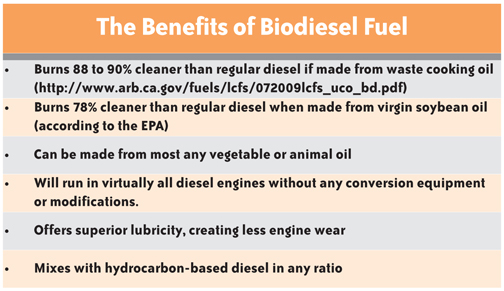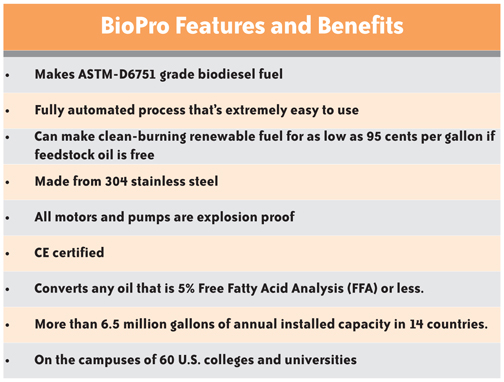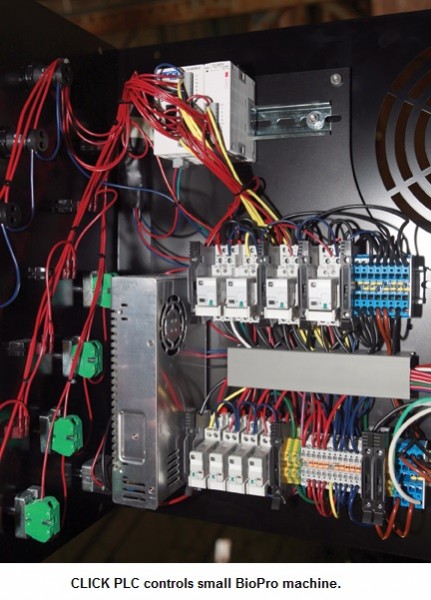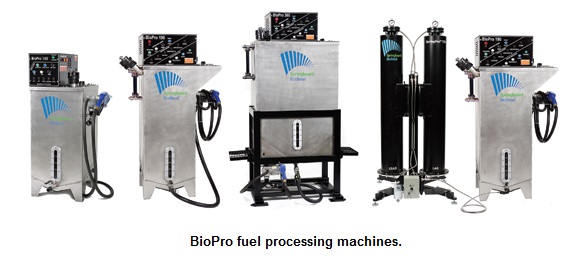Systems produce bio diesel for a total cost as low as 67 cents per gallon, turning waste into profit.
Imagine if restaurants and other commercial food enterprises could turn used kitchen oil into fuel instead of simply disposing of it. Then imagine if they could do that in an economic and automated way for a fraction of the cost of the petroleum diesel that it replaces. Now add in the ability to process other oils extracted from crops, and to generate valuable byproducts such as animal feed.

At Springboard bio diesel, our customers are doing just that by using our BioPro™ bio diesel processors to convert organic oils into ASTM-grade bio diesel that works with any diesel engine.
We’ve designed our small-scale processor series of machines, named the BioPro, to do the majority of the work through an automated process that requires almost no user interaction. No more turning valves, metering in chemicals and carefully monitoring the machine. Instead, users simply add the required ingredients and press a button. All over the world, BioPros are recycling waste oils into low-cost clean fuel. The Florida National Guard produces biodiesel from used vegetable oil to fuel state maintenance vehicles at the Camp Blanding Joint Training Center in Starke, Florida. Remarkably, the Guard has been able to convert its waste cooking oil to bio diesel for a total cost of 67 cents per gallon, when all savings from waste disposal are taken into account.
Daphne Utilities in Alabama created its award-winning cooking grease recycling program with a BioPro 190, in the process reducing sewer spills caused by grease plugs that posed a risk to nearby Mobile Bay. The public drops off used cooking oil at stations throughout the city, and the utility processes the oil into fuel.
With a mere $12,000 start-up cost, Daphne Utilities saves approximately $10,000 a year by creating bio diesel from used oil for about a dollar a gallon, not to mention the significant savings from a 40 percent reduction in spills and avoided waste oil disposal costs.
Nothing goes to waste, as the utility uses the bio diesel to run emergency power generators, and as a fuel additive to increase lubricity. It even uses the glycerin generated during the cooking oil processing to make soaps that are used to educate the public about the program.
 The Colusa Indian Community Council uses its BioPro 380 to make bio diesel from a combination of reclaimed cooking oil from the council’s casino restaurants, and from safflower oil extracted from sunflowers grown by the tribe. When making biodiesel from sunflower screenings mixed with almond shells at a 90-10 blend, the remaining meal can be sold for approximately $200 per ton for use as a protein-rich feed for livestock. The council calculates its total cost to make bio diesel including chemical inputs, energy and labor is $1.50 per gallon. And that’s before including tax credits for alternative energy equipment.
The Colusa Indian Community Council uses its BioPro 380 to make bio diesel from a combination of reclaimed cooking oil from the council’s casino restaurants, and from safflower oil extracted from sunflowers grown by the tribe. When making biodiesel from sunflower screenings mixed with almond shells at a 90-10 blend, the remaining meal can be sold for approximately $200 per ton for use as a protein-rich feed for livestock. The council calculates its total cost to make bio diesel including chemical inputs, energy and labor is $1.50 per gallon. And that’s before including tax credits for alternative energy equipment.
Processing Particulars
Before starting the process, the user fills the machine with 50 gallons of filtered, dewatered oil (the machine can also assist in dewatering). The BioPro can process almost any non-petroleum natural oil including, but not limited to, tallow, animal fats and vegetable oil. The waste vegetable oil gathered from kitchens and restaurants is the most common feedstock, but a vast variety of other oils can also be used.
After filling the machine with oil, the user then adds a predetermined amount of sulfuric acid catalyst followed by methanol. The user then presses the Start button, and waits for the mixing to begin. There’s no need to monitor the machine while it does its work, which cuts labor costs and ensures consistent quality and superior safety.
A multi-stage process begins to convert the oil feedstock into ready-to-use bio diesel fuel. The first stage is called Esterification, or simply the “acid” stage.
During this stage, the machine mixes sulfuric acid and a portion of the methanol into the waste oil. The sulfuric acid modifies the free fatty acids so the methanol can attach to them.
When the acid stage is complete, the Transesterification or “base” stage begins. The machine mixes the base catalyst and the rest of the methanol. Usually lye (sodium hydroxide – NaOH) or caustic potash (potassium hydroxide – KOH) acts as a catalyst to break the molecules apart into glycerol and fatty acid chains. Immediately after the molecules are broken apart, the methanol attaches to the fatty acid chains, causing the glycerol molecules to drop out of the oil and become glycerin.During this stage the machine is mixing the oil, chemicals and methanol together with an extremely powerful, tri-blade impeller. This helps to vigorously mix fluids and chemicals together to ensure the oil is chemically altered.
After both reactions have occurred, the oil settles for a period of several hours. The glycerin falls to the bottom of the tank and separates from the bio diesel.
Following the settling period, the user drains out the settled glycerin and begins the washing cycle; this is the only user interaction required during processing.
In the washing process, the machine turns on the heat and lightly sprays a mist of clean, fresh water into the bio diesel. Although it may sound strange to add water to bio diesel, water is heavier so it quickly falls to the bottom.
As the water falls, excess methanol and soap molecules attach to the water and fall with it, thereby cleansing the bio diesel. Another mist wash is performed using the big tri-blade mixing impeller. We call this an agitated wash cycle, and it’s used to pull impurities from the bio diesel.
Everything then settles for a few hours, the water drains and another agitated mist wash starts. Upon completion, the water settles to the bottom and is automatically pumped out by the machine.
After the wash water is drained, the heat remains on and the tri-blade impeller starts again. The combination of heat and mixing evaporates excess water from the freshly washed bio diesel. The bio diesel settles out one last time to finalize the evaporation.
That’s all there is to it. There’s no need to transfer fluids from container to container, as the machine does this automatically.
When processing is completed, users connect the hose to the included fuel pump to fuel their vehicles.
Automating the Process
Creating bio diesel from common waste oils is an interesting and somewhat complex chemical processing operation, but this complexity is unburdened from the end user by automation. The BioPro relies heavily on Programmable Logic Controllers (PLCs) from AutomationDirect (www.automationdirect.com) to control all the various functions of the machine, making the PLC the brains of the machine. For example, the PLC tells the machine when and how long mixing occurs, when and how pumping occurs, when draining begins, etc.
 We use the AutomationDirect CLICK PLC or the DirectLOGIC DL105 PLC depending on the size of the machine. Since the CLICK doesn’t require a mounting base, it works well for the smaller machines where space is at a premium. For the larger machines, we use a DirectLOGIC PLC because it has more of the required discrete and analog inputs and outputs.
We use the AutomationDirect CLICK PLC or the DirectLOGIC DL105 PLC depending on the size of the machine. Since the CLICK doesn’t require a mounting base, it works well for the smaller machines where space is at a premium. For the larger machines, we use a DirectLOGIC PLC because it has more of the required discrete and analog inputs and outputs.
We’ve written several programs for the PLC which allow optional procedures to be automatically executed according to field conditions.
For instance, the PLC is preprogrammed to accommodate additional equipment that works with our processor systems, such as the INCOSEP™, a device that can be installed inside the BioPro 190 or the BioPro 380 that enables users to more than double their bio diesel processing speed.
The CLICK PLC’s free programming software, downloadable from the AutomationDirect Web site, helps keeps the price down on our smaller machines.
In addition to PLCs, we use NITRA pneumatic solenoid valves purchased from AutomationDirect for our pumps. Everything we use must be high quality and durable, and we find that AutomationDirect components fit the bill. We tried a variety of solenoids during development that didn’t work as well, so we decided on the higher quality NITRA solenoids to ensure that our pumps operate smoothly.We also use many signal conditioners from AutomationDirect, such as the FC-T1 thermocouple signal conditioner, and we find that the DIN-mount adaptor makes installation easy.
We appreciate that AutomationDirect provides quality and user-friendly products at a competitive price, but service is also an important factor. We’re a company that prides itself on customer service and has a real person answer the phone when customers call, so we’re glad that when we need support, a real person at AutomationDirect answers the phone and helps us in a timely manner.
Quick Payback
Our machines span from the BioPro 150 which makes 40 gallons every 48 hours, to the BioPro380EX in line with a SpringPro T76 which makes 100 gallons every 13 hours. Cost per gallon is determined largely by the number of gallons made, and the cost of the oil feedstock.

For example, a university uses our BioPro 380EX, which makes 100 gallons of bio diesel from 100 gallons of cooking oil every 23 hours, to make 2400 gallons per month. In this scenario, payback for the machine and labor is achieved in only in three and a half months, assuming regular diesel is four dollars a gallon.
We’re proud of our BioPros, but we aren’t stopping there. The California Energy Commission recently selected Springboard bio diesel from numerous applicants for a grant to assist with the completion of our new closed-loop production facility.
For this project we will need more inputs and outputs, so we’ve selected the Productivity3000 programmable controller from AutomationDirect.
For this larger application, we decided on the Productivity3000 because it provides a number of features that we need, such as seven communication ports (including Ethernet), and built-in local I/O expansion capabilities. The Productivity3000 is very competitive in price, and combines the features and capabilities of a PC-based control system with the cost and compact size of a PLC.
We’re dedicated to supplying consumers with an economical way to create bio diesel in an automated process from materials that would otherwise be wasted or end up in landfills. As we keep expanding our offerings, we will continue to rely on high-quality and cost-competitive automation components from AutomationDirect to make our machines as economical as possible.
To read more articles about programmable control, click here.
Disclaimer: AutomationDirect does not guarantee the products described in this article are suitable for your particular application, nor do we assume any responsibility for your product/system design, installation, or operation.
Originally Posted: June 1, 2012

